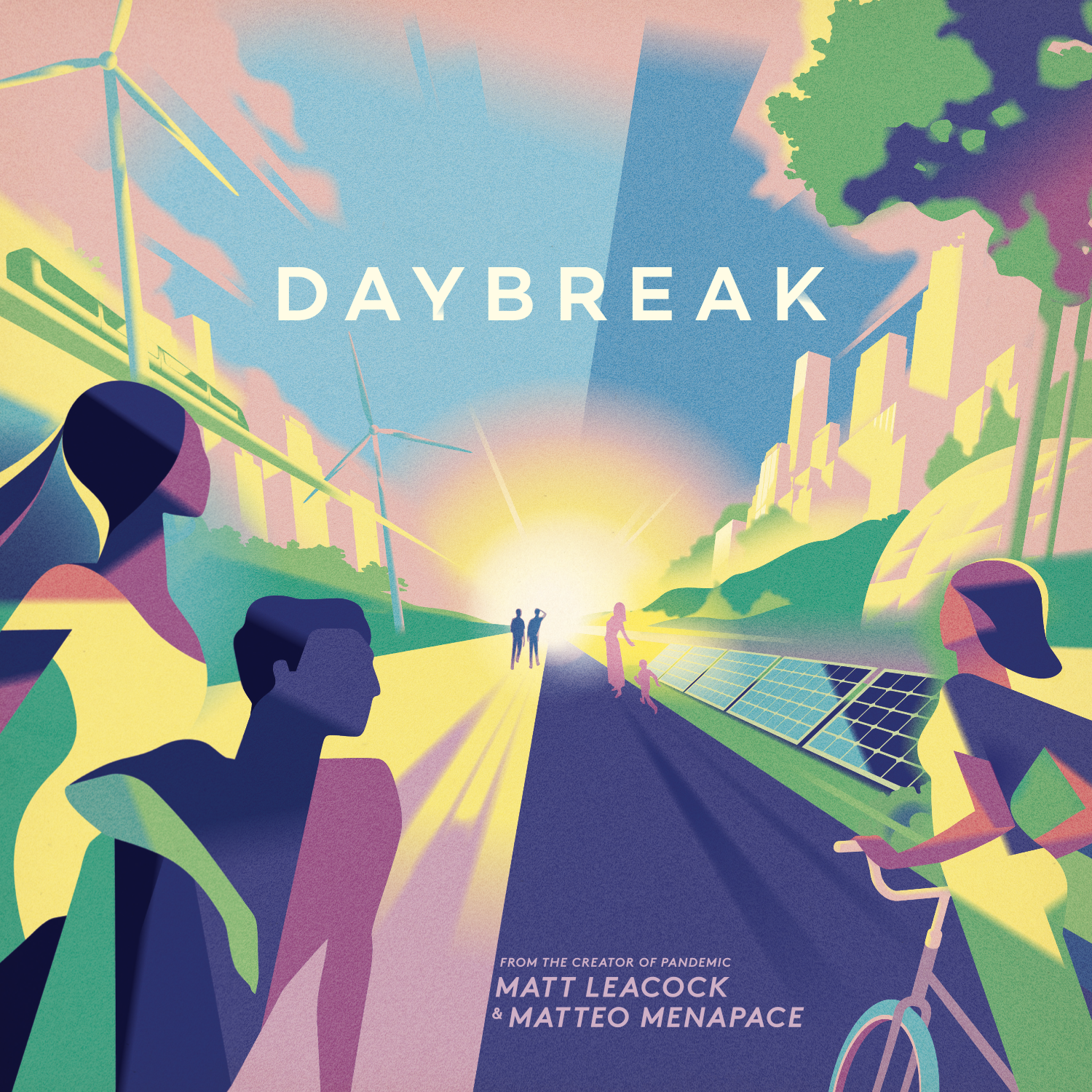Playing with Science: Learning about Climate Change through the board game Daybreak
By Emma Frances Bloomfield
Image © CMYK/Daniel Forero.
During the COVID-19 pandemic, Kickstarter pledges for board games skyrocketed. Trapped at home with flexible working hours and far less commute time, some people turned to board games as entertainment. A new wave of board games coming out of the early 2020s have focused on pressing scientific topics such as climate change. While nature-themed games are common mainstays for board games, recent releases have directly incorporated the language of our changing climate in the game play and mechanics. Board games are being explored as a way to use an interactive narrative to communicate complex and intangible scientific topics such as evolution or a changing climate. Of the many board games in this emerging game genre, I provide some insight into the board game Daybreak.
Matt Leacock—creator of the popular Pandemic cooperative games—partnered with Matteo Menapace to release Daybreak in 2023. The game mirrors the cooperative spirit of Pandemic to address a global crisis, but each player, playing as a different country in the world, must balance their own personal objectives while helping reduce the collective amount of carbon. Everyone must work together to reduce carbon levels, because the more carbon on the board means that the global temperature rises and players must draw crisis cards such as “Storms” and “Infrastructure Meltdown” that put players’ communities in crisis. If any player reaches 12 communities in crisis, the game is over for everyone. At the same time, contributing to the global mission to reduce carbon blocks that accumulate may lead to the sidelining of personal objectives, such as shoring up social justice efforts or renewable technologies.
Image © CMYK/Daniel Forero.
As an interesting gameplay mechanic, players can play cards on their own playing space in front of them or on other players’ spaces. Cards such as “Early Warning Systems” help reduce the impact of crisis cards, while cards like “Reforestation” will create more trees that help sequester carbon on the board and do not contribute to rising temperatures. Playing a card with matching icons will give yourself or other players advantages through creating compounding bonuses that help to reduce carbon for everyone.
When I first played the game, I initially thought the gameplay was quite simple and that my partner and I would beat the game handily. Much like real effort to reduce climate change, my game partner and I focused first on our personal objectives, because the carbon blocks at the start seemed manageable. Our strategy of delaying more aggressive actions meant that the carbon blocks quickly accumulated between rounds. Our attempts to advance individual objectives sidelined addressing global goals early, which was needed to lay the foundation for later combinations that would eliminate exponential carbon growth. The game mechanic for growing carbon is partially random but also likely to produce more carbon the farther along in gameplay one is, meaning that small moves at the beginning sets one up for later success.
Image © CMYK/Daniel Forero.
Lest we think that the game is arguing that we’ve already missed our window of opportunity, the game emphasizes the power of international cooperation, the dual advancement of individual and collective goals, and the compatibility of economic and environmental progress. The game mechanics, in my interpretation, are more about how small impacts and moves now can pave the way for more impactful interventions later on, meaning there is still hope to forestall carbon overwhelm.
While having fun, players can also learn about options for environmental sustainability and the importance of global collaboration to tackle our changing climate. Other games such as Weather Machine, Evolution: Climate, and the forthcoming We All Take from the River are also part of what I would call an eco-board game genre that aims to incorporate climate and environmental themes with an eye towards advocacy and raising awareness with their gameplay. Beyond climate change, scientific topics such as evolution, diversity of plant and animal life, and energy management are common themes in board games that are educational and entertaining. If you are interested in learning more about board games that incorporate scientific topics, please come to Meepleville in Las Vegas on March 8, 2025 at 1pm to play Daybreak, Darwin’s Journey, and Catan: New Energies.
Emma Frances Bloomfield is associate professor of communication studies at the University of Nevada, Las Vegas, whose research focuses on science and environmental communication. She is the author of Science v Story: Narrative Strategies for Science Communicators (University of California Press, 2024) and Communication Strategies for Engaging Climate Skeptics: Religion and the Environment (Routledge, 2019). She is the founder and director of UNLV’s Public Communication Initiative in the Greenspun College of Urban Affairs, which conducts workshops and trainings on communicating science to the public.




